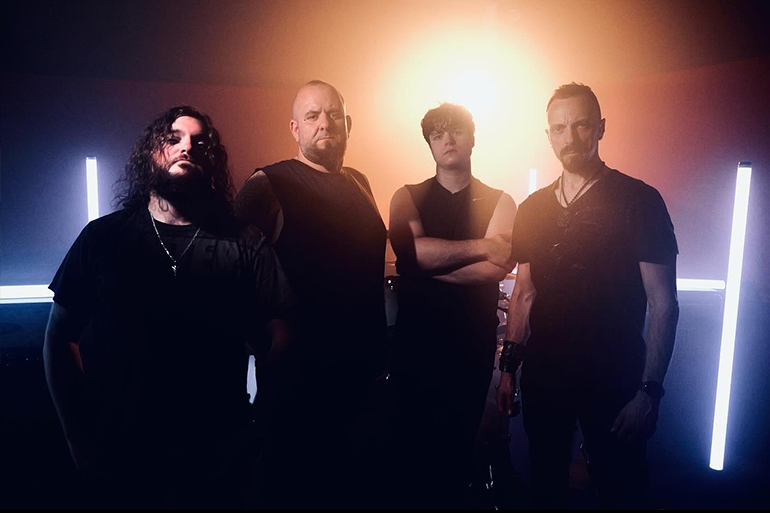“Beyond the Switch is about shedding what no longer fits, even when it hurts”, SELIAS
With the release of “Beyond the Switch,” SELIAS marks a transformative moment not only in their sound but also in their lyrical and emotional approach. The single, which blends heavy layers with an almost cinematic atmosphere, explores breaking free from destructive cycles and the introspection that follows the pain of betrayal. The track is a turning point for both the band and the concept behind Killkarma, an album deeply focused on breaking emotional and spiritual patterns.
By Sandra Pinto
In conversation with the band, we discover how influences like In Flames, Rammstein, and Orbit Culture, combined with a unique and visceral approach to sound, shaped this new chapter for SELIAS. Additionally, the video for “Beyond the Switch” — equally intense and visually charged — complements the sensory experience of the song, with a visual narrative that mirrors the emotional weight of the track. In this context, the band reflects on the impact of their music live, the creative process behind the sound, and their expectations for the highly anticipated Killkarma release.
“Beyond the Switch” seems to mark a turning point, both thematically and musically. What inspired the story behind this particular track?
The spark came from that instant when something inside you flips — when survival becomes transformation. Steve had written these tight, pressurized riffs that instantly felt like a breaking point, and I remember thinking, this is the sound of someone crossing a line. From there, we built the theme together: it’s about shedding what no longer fits, even when it hurts. The lyrics are the voice of that shift — the moment when resistance turns into rebirth.
The single explores themes of betrayal and transformation — was there a personal or collective experience that influenced its creation?Absolutely. Everyone’s been through some kind of betrayal, and we’d all been feeling that in our own ways. For me, it came from realizing how often we keep playing roles that don’t serve us anymore. Writing “Beyond the Switch” was a release — a purge. It’s less about revenge and more about clarity. Dan’s rhythmic phrasing really captured that emotional turbulence; his drum parts feel like a heartbeat that’s trying to steady itself after chaos.
How does “Beyond the Switch” reflect the larger narrative or concept behind Killkarma?
Killkarma is built around the idea of breaking cycles — emotional, spiritual, karmic. “Beyond the Switch” is that decisive cut in the loop, where awareness becomes action. It sits right at the emotional center of the album. Musically it starts claustrophobic and ends with this sweeping, almost cinematic climax — the sound of finally breathing again after being underwater too long.
The sound balances heaviness with atmosphere. What was your process in achieving that blend?
We treat heaviness as emotion, not volume. Steve’s guitar work gives the structure its pulse — he writes riffs that are both mechanical and alive, almost like moving gears under pressure. Then we layered textures and dynamics around that, letting tension guide every shift. The balance came from restraint — knowing when to let space speak instead of filling every bar. That’s what gives the track its sense of movement and release.
You’ve mentioned influences like In Flames, Rammstein, and Orbit Culture. How have those shaped this new era for SELIAS?
Those bands taught us discipline in chaos. In Flames showed how melody can be weaponized. Rammstein taught the power of simplicity — that one perfectly placed riff can hit harder than ten. And Orbit Culture brought modern weight and cinematic scale into the picture. We absorbed those lessons but filtered them through our own lens — we’re not chasing anyone’s sound. This record is the first time Selias really sounds like Selias.
The video for “Beyond the Switch” is visually intense. How involved were you in its creative direction?
Completely. Visual storytelling is an extension of our music. The concept grew out of the song’s tension — the feeling of being trapped inside transformation. We worked closely with our director to make it feel physical, almost suffocating at first, then progressively more open and luminous. It’s not about narrative; it’s about emotional temperature. Every shot mirrors the internal conflict that drives the song.
This is your second single from Killkarma. How does it contrast with “Bullets”?
They’re connected but speak different languages. “Bullets” is rebellion turned outward — pure confrontation. “Beyond the Switch” turns that energy inward. It’s the aftermath of destruction, when you realize the next battle is internal. Sonically, “Bullets” hits you in the face; “Beyond the Switch” pulls you in, then expands into something almost cinematic. That final section feels like a release you didn’t know you needed.
There’s a cinematic quality to your songwriting. Do you approach it like storytelling or scoring?
Always. We think in visuals — movements, moods, light shifts. When we write, we talk about what the scene feels like, not what the chord is. That’s why every song has an emotional arc rather than a formula. “Beyond the Switch” feels like a transformation sequence; you can picture it unfolding frame by frame. It’s less a song and more a short film in sound.
How have fans responded to the new material live?
It’s been wild. When we play “Beyond the Switch,” you can sense the tension in the room build before the final climax hits. Then it erupts — it’s like collective release. People connect deeply to the energy, even before knowing the lyrics. That’s when you know a song works — when it bypasses explanation and goes straight to instinct.
With Killkarma coming in November, what do you hope listeners take away from the full album?
Freedom. Killkarma is about confronting what traps you — whether it’s guilt, fear, or your own history — and then burning it down. It’s heavy, emotional, and human. We didn’t write it to impress; we wrote it to survive. If listeners come out of it feeling like they faced something in themselves and came out lighter, that’s everything we hoped for.





